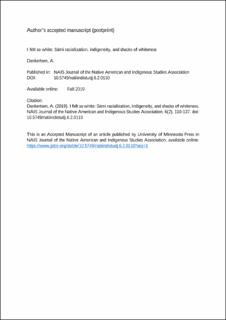I felt so white : Sámi racialization, indigeneity, and shades of whiteness
Peer reviewed, Journal article
Accepted version
Permanent lenke
https://hdl.handle.net/11250/2659804Utgivelsesdato
2019Metadata
Vis full innførselSamlinger
Originalversjon
Dankertsen, A. (2019). I felt so white: Sámi racialization, indigeneity, and shades of whiteness. NAIS Journal of the Native American and Indigenous Studies Association, 6(2), 110-137. doi: 10.5749/natiindistudj.6.2.0110Sammendrag
This article explores how whiteness and race are understated, but still relevant, categories of identification in Sápmi today. I use autoethnography in combination with qualitative data as a strategy to challenge the silence around whiteness and critically investigate its status as unmarked majority position. With concepts from feminist, post-colonial, and anti-racist theory, I discuss how the social construction, categorization, and embodied practices of “race” are part of being Sámi even today. I argue that the old ideologies about the Sámi as a distinct race still are implicit in everyday life as well as in research, and that there is a need for a theoretical debate about these issues both in academia and in society in general. Whiteness studies is a field of research that has emerged, where researchers focus on the social identity and location of whiteness, and the often taken-for granted privilege of whiteness ((Frankenberg 1993, McIntosh 2004, Roediger 1992, Lipsitz 1995, Berg, Flemmen, and Gullikstad 2010, Dyer 2016, Rothenberg 2008, Bonds and Inwood 2016) sharing some perspectives with critical race theory (Crenshaw 1995, Delgado and Stefancic 2012). Whiteness in this perspective is more than a skin color. It is a political and cultural term that signifies status, power, and character (Perkins 2004), a place from which people look at themselves, at other and at society, and a cultural practice (Frankenberg 1993), and a social and historical identity and an epistemically and salient and ontologically real entity that have survived it constantly changing boundaries (Alcoff 2006, 2015). The topic of race and racism is an ambiguous and complex issue in Sápmi today. On the one hand, there is a history of colonization and racialization of the Sámi people, with race biology and racist politics starting from the mid 1800s to mid 1900s, defining the Sámi as a primitive and exotic race of Asian origin, rather than as white Europeans (Kyllingstad 2012).
Beskrivelse
Author's accepted version (postprint). This is an Accepted Manuscript of an article published by University of Minnesota Press in NAIS Journal of the Native American and Indigenous Studies Association. Available online: https://www.jstor.org/stable/10.5749/natiindistudj.6.2.0110?seq=1
